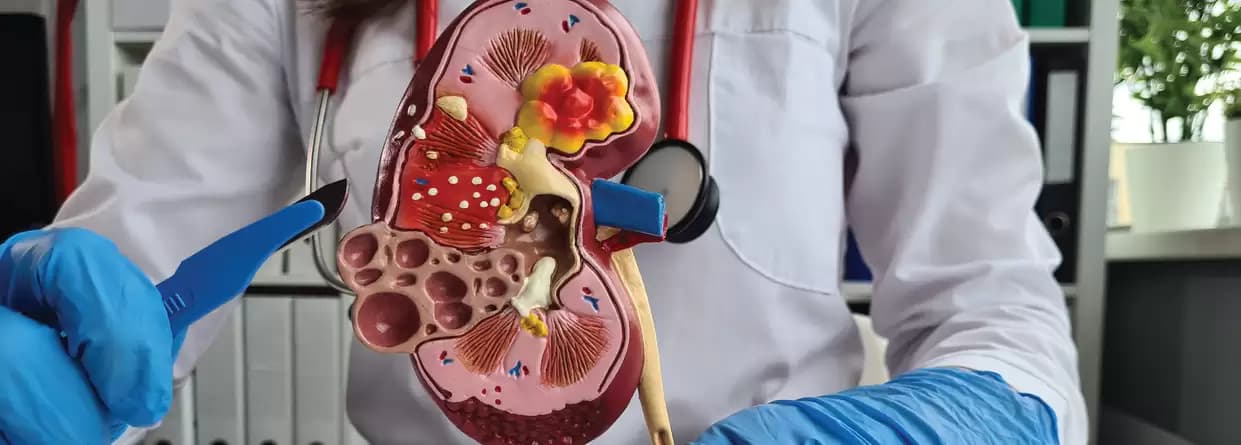
In this write-up, you will gain information on everything related to kidney cysts and their removal, so make sure to give it a read.
Do you feel the urge to urinate frequently? If yes, then it could be a sign of a kidney cyst. A kidney cyst is a sac filled with fluid that grows in your kidneys. Usually, people who have kidney cysts aren’t aware that they have them. The kidneys are vital organs in our body as they filter out the waste from the blood before passing it out in the form of urine. They are also crucial for blood pressure regulation and managing various other bodily functions.
Generally, people experience a single cyst on one kidney or more than one cyst on both kidneys. There are two types of cysts, polycystic kidney disease and simple cysts. Simple cysts are individual ones formed on the kidneys. These cysts have thin walls and include water-like fluid. This type of cyst doesn’t harm the kidneys and doesn’t affect their functionalities as well.
On the other hand, polycystic kidney disease is a condition that is inherited and causes more than one kidney cyst. If these cysts keep growing, then it causes damage to the kidneys. However, cysts are in general harmless as they don’t involve symptoms in some individuals and you might not even know that you have them.
In this write-up, you will gain information on everything related to kidney cysts and their removal, so make sure to give it a read.
Yes, kidney cysts also have symptoms like any other health condition but some people might not notice them or may not have any symptoms. Kidney cysts’ symptoms are usually noticeable when they grow large and become infected. Here are the symptoms:
The symptoms of polycystic kidney disease are back and side pain, high blood pressure, and blood in the urine.
What causes kidney cysts are not yet fully understood. As per a study, it is found that men are more likely to experience the problem than females. And people aged 50 or above also have one or more simple cysts in their kidneys. The cyst's size also increases with age and keeps multiplying over the years. Polycystic kidney diseases can be attributed to genetic mutations.
Most kidney cysts don’t pose complications or issues; however, there may be complications in rare cases. The complications of kidney cysts usually are ruptured cysts, infected cysts, and swollen kidneys caused by urine obstruction.
If you observe complications or notice that symptoms are intensifying, you must seek medical attention immediately. Most complications are easily manageable, including ruptured cysts as well but it is crucial to get prompt treatment.
The important part of kidney cysts diagnosis is consulting your doctor and providing information on the symptoms that you are experiencing. Your doctor, depending on the symptoms, might order various tests such as:
If kidney cysts are causing your symptoms, then your healthcare expert recommends a kidney cyst removal procedure followed by treatment options. Here is how cysts are removed from the kidney:
Kidney cyst removal surgery is rarely performed and is mainly used for complex cysts with variations that can be cancerous.
You cannot do anything to prevent kidney cysts. However, you can take some steps like drinking plenty of water and making sure to consume less than 2300 mg sodium a day. It is important for those having conditions like high blood pressure or long-term kidney disease.
If you observe kidney cyst symptoms, it’s crucial to have this evaluated by a specialist. Most kidney cysts aren’t dangerous and don’t pose serious problems. If a cyst develops, it can be removed with surgery without any long-term complications. However, you have to be cautious if you have polycystic kidney disease (PKD). It is a serious situation and can lead to high blood pressure and even kidney failure. So, make sure not to overlook PKD symptoms and consult a kidney specialist in Jaipur as soon as possible.
You must consult a doctor if you notice signs like pain on the sides between the ribs, hips, stomach, or back, fever, frequent urination, and blood in the urine. These symptoms indicate that cysts are ruptured or infected.
Kidney cysts are usually not dangerous but only if an individual has simple kidney cysts. There is very less probability that simple kidney cysts will turn into something serious, however polycystic kidney disease can be dangerous. Hence, if you have PKD, then you may require immediate treatment.
Written and Verified by:

Dr. Devendra K. Sharma is Director of Urology & Renal Transplant Dept. at CK Birla Hospital, Jaipur with over 22 years of experience. He specializes in renal transplantation, laparoscopic urology, female urology and paediatric urology.
Similar Renal Sciences Blogs
Book Your Appointment TODAY
© 2024 RBH Jaipur. All Rights Reserved.